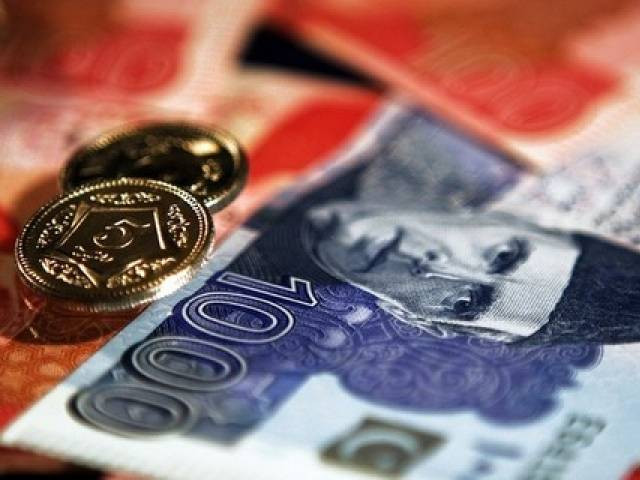Pakistan has to repay $6b foreign debt in six months
Amnesty scheme under study for offshore assets; govt may present its 6th budget.

PHOTO: BLOOMBERG
In his maiden interaction with media after taking oath a day earlier, Afzal said in order to broaden the tax net, an amnesty scheme was also under consideration to facilitate Pakistanis in bringing back money from abroad.
He also spoke about the possibility of presenting the upcoming fiscal year 2018-19 budget by the PML-N government which would be the sixth during its tenure.
Foreign exchange: SBP's reserves down 1.39%, stand at $14.1b
He was of the view that the sitting government would be in a better position to manage the budget, adding the upcoming interim government would find it very difficult to present the national budget as it would have very little time for preparation.
The $6-billion foreign debt repayment is significantly higher than the $3.6 billion Finance Secretary Shahid Mehmood shared with the National Assembly Standing Committee on Finance last week.
“Next six months are crucial for management of the economy,” declared the state minister. He categorically stated that the government had no plan to go to the International Monetary Fund (IMF) for bailout.
In recent years, Pakistan’s external sector obligations have mounted after huge loans contracted by the PML-N and Pakistan Peoples Party (PPP) governments in the past nine and a half years. These foreign debt and profit repatriation-related obligations will balloon further after 2020 when the China-Pakistan Economic Corridor (CPEC) projects will start maturing.
The current account deficit has also widened significantly due to growing imports and shrinking exports, bringing the foreign currency reserves under strain. Pakistan’s gross official foreign currency reserves stood at $14.133 billion as of December 22, hardly sufficient for three months of imports.
Afzal said there was also a need to bring clarity on the foreign direct investment (FDI) issue under CPEC. There were some CPEC proceeds that were neither recorded as FDI nor were reflected in imports.
The minister emphasised that there were many sectors which had been performing well and cited the examples of remittances and large-scale manufacturing (LSM) sector.
He was of the view that the budget deficit would be restricted to 5%, though the IMF projection put it at 5.3% of gross domestic product (GDP).
Talking about performance of the economy, the minister said Pakistan was well positioned to easily achieve 5.8% GDP growth and voiced hope that the 6% target was also achievable.
Tax reforms
Afzal said the government was devising a strategy to go after tax evaders and initially 10,000 people had been identified on the basis of data, who would be brought under the tax net from next month.
These potential taxpayers have been identified in different fields including education, property and other services.
The first batch of 10,000 potential taxpayers would be served notices at the beginning of next month, he said.
The minister believed that the recently imposed regulatory duty on various import goods would begin showing its positive effects on revenue collection soon.
He pointed out that the number of tax return filers had also increased from 0.914 million last year to 1.14 million so far in the current fiscal year 2017-18, which he termed a positive sign.
Speaking about the proposed amnesty scheme aimed at encouraging Pakistanis to bring back money from abroad, Afzal said four options were under consideration.
These included the introduction of a bill in the National Assembly immediately, waiting for Senate elections that would give the PML-N a majority, promulgating a Presidential Ordinance or introducing the scheme through a money bill from the new fiscal year.
Afzal said the stringent regimes being introduced across the world by the Organization of Economic Cooperation and Development (OECD) had provided an opportunity for Pakistan.
China wants to end control over local govt debt
According to the Federal Board of Revenue’s (FBR) proposal, in return for legalising the hidden offshore assets, the non-resident and resident Pakistanis will pay foreign asset tax.
Assets located outside Pakistan and have been held for more than five years up to June 30, 2016 could be subject to 2% tax. Income and assets outside Pakistan which are repatriated by June 15, 2017 through official banking channels to Pakistan and the receipt attached with the declaration will be subject to 5% tax.
Assets located outside Pakistan for which only the declaration is made will be levied 7.5% tax. Foreign currency and bearer assets will be subject to 15% tax.
Published in The Express Tribune, December 29th, 2017.
Like Business on Facebook, follow @TribuneBiz on Twitter to stay informed and join in the conversation.


















COMMENTS
Comments are moderated and generally will be posted if they are on-topic and not abusive.
For more information, please see our Comments FAQ